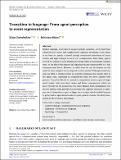Files in this item
Transition to language : from agent perception to event representation
Item metadata
| dc.contributor.author | Zuberbühler, Klaus | |
| dc.contributor.author | Bickel, Balthasar | |
| dc.date.accessioned | 2022-06-01T15:30:22Z | |
| dc.date.available | 2022-06-01T15:30:22Z | |
| dc.date.issued | 2022-05-31 | |
| dc.identifier | 279820903 | |
| dc.identifier | c544471b-9451-4a5b-91af-2476a5e2b668 | |
| dc.identifier | 85131054411 | |
| dc.identifier | 000803165300001 | |
| dc.identifier.citation | Zuberbühler , K & Bickel , B 2022 , ' Transition to language : from agent perception to event representation ' , WIREs Cognitive Science , vol. Early View , e1594 . https://doi.org/10.1002/wcs.1594 | en |
| dc.identifier.issn | 1939-5078 | |
| dc.identifier.other | RIS: urn:DF3DD2C44EE4D0F9E2D018DFF6EDDD53 | |
| dc.identifier.other | ORCID: /0000-0001-8378-088X/work/114023134 | |
| dc.identifier.uri | https://hdl.handle.net/10023/25480 | |
| dc.description | Open access funding provided by Universite de Neuchatel. Authors are grateful to the Swiss National Science Foundation (grant numbers 310030_185324 and 100015_182845) with further from funding from the NCCR Evolving Language (SNSF 51NF40_180888). | en |
| dc.description.abstract | Spoken language, as we have it, requires specific capacities-at its most basic advanced vocal control and complex social cognition. In humans, vocal control is the basis for speech, achieved through coordinated interactions of larynx activity and rapid changes in vocal tract configurations. Most likely, speech evolved in response to early humans perceiving reality in increasingly complex ways, to the effect that primate-like signaling became unsustainable as a sole communication device. However, in what ways did and do humans see the world in more complex ways compared to other species? Although animal signals can refer to external events, in contrast to humans, they usually refer to the agents only, sometimes in compositional ways, but never together with patients. It may be difficult for animals to comprehend events as part of larger social scripts, with antecedent causes and future consequences, which are more typically tie the patient into the event. Human brain enlargement over the last million years probably has provided the cognitive resources to represent social interactions as part of bigger social scripts, which enabled humans to go beyond an agent-focus to refer to agent-patient relations, the likely foundation for the evolution of grammar. | |
| dc.format.extent | 7 | |
| dc.format.extent | 887785 | |
| dc.language.iso | eng | |
| dc.relation.ispartof | WIREs Cognitive Science | en |
| dc.subject | Event perception | en |
| dc.subject | Evolution of grammar | en |
| dc.subject | Script theory | en |
| dc.subject | Theory of mind | en |
| dc.subject | Vocal learning | en |
| dc.subject | BF Psychology | en |
| dc.subject | T-DAS | en |
| dc.subject | MCC | en |
| dc.subject.lcc | BF | en |
| dc.title | Transition to language : from agent perception to event representation | en |
| dc.type | Journal article | en |
| dc.contributor.institution | University of St Andrews. Institute of Behavioural and Neural Sciences | en |
| dc.contributor.institution | University of St Andrews. Centre for Social Learning & Cognitive Evolution | en |
| dc.contributor.institution | University of St Andrews. School of Psychology and Neuroscience | en |
| dc.identifier.doi | 10.1002/wcs.1594 | |
| dc.description.status | Peer reviewed | en |
This item appears in the following Collection(s)
Items in the St Andrews Research Repository are protected by copyright, with all rights reserved, unless otherwise indicated.

